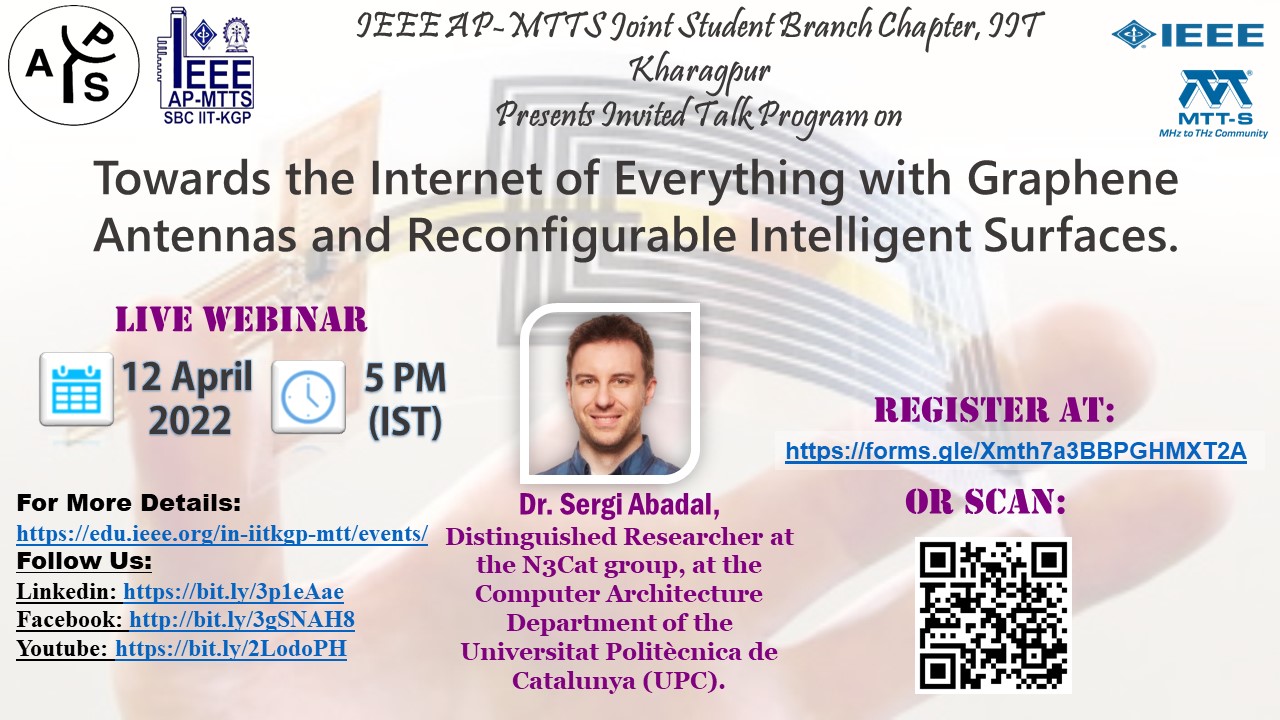“Towards the Internet of Everything with Graphene Antennas and Reconfigurable Intelligent Surfaces” on 12th Apr, 2022

Dear all,
Hope you are doing well.
Please find the details of the following talk organized by the IEEE AP-MTTS IIT Kharagpur along with the Registration link.
Title: “Towards the Internet of Everything with Graphene Antennas and Reconfigurable Intelligent Surfaces”
Presenter: Dr. Sergi Abadal, Distinguished Researcher at the N3Cat group, at the Computer Architecture Department of the Universitat Politècnica de Catalunya (UPC)
Time: 05:00 PM IST
—————————————–
Registration link: https://forms.gle/Xmth7a3BBPGHMXT2A
—————————————–
Short bio of the Speaker:
Sergi Abadal received the PhD in Computer Architecture from the Department of Computer Architecture, Universitat Politècnica de Catalunya (UPC), Barcelona, Spain, in July 2016. Previously, he had obtained the MSc and BSc in Telecommunication Engineering at UPC in 2011 and 2010, respectively. He has held several visiting positions in Georgia Tech in 2009, University of Illinois Urbana-Champaign in 2015 and 2017, and the Foundation of Research and Technology – Hellas in 2018. Currently, he is Coordinator of the European H2020 WIPLASH project and holder of a Starting Grant from the European Research Council (ERC). From 2020, he acts as one of the ambassadors of the European Innovation Council (EIC) through its program of National Champions. He is Area Editor of the Nano Communication Networks (Elsevier) Journal, has served as TPC member of more than 20 conferences, and has published over 80 articles in top-tier journals and conferences. Abadal was the recipient of the Nano Communication Networks Young Investigator in 2019, UPC Outstanding Thesis award in 2016, the INTEL Doctoral Fellowship in 2013, Accenture Award for MSc students in 2012. His current research interests are in the areas of chip-scale wireless communications, including channel modeling and protocol design, and the application of these techniques for the creation of next-generation computer architectures.
—————————————–
Advances in RF design enable the implementation of wireless communications at the mmWave to THz bands, potentially leading to very high speeds while using tiny antennas and transceivers. This is expected to be translated into wireless networks with unprecedented levels of performance and efficiency, as well as the capacity to enter into uncharted territories such as inside the body or inside the chips, opening a plethora of disruptive applications in the context of the Internet of Everything. In this talk, we will describe two groundbreaking technologies and their implications in wireless networks in 6G and beyond. On the one hand, we will introduce recent works on graphene antennas, whose plasmonic properties at THz frequencies lead to extreme levels of miniaturization and unprecedented tunability. We will describe Wireless Network-on-Chip (WNoC), a novel area-constrained application uniquely suited to the characteristics of the highly-integrated, ultra-high speed wireless communications enabled by graphene, and that shows potential for a paradigm shift in the field of computer architecture. On the other hand, we will review the concept of Reconfigurable Intelligent Surfaces (RIS), whose powerful control over electromagnetic waves allows them to modify the characteristics of the wireless channel in unprecedented and software-defined ways. This will be particularly critical in the THz band, since multiple phenomena impair propagation and limit the transmission distance in this part of the wireless spectrum. We will briefly revisit the fundamentals of RIS in the mmWave-THz bands, to then conclude the talk by summarizing the main applications of RIS in the context of 6G networks.


